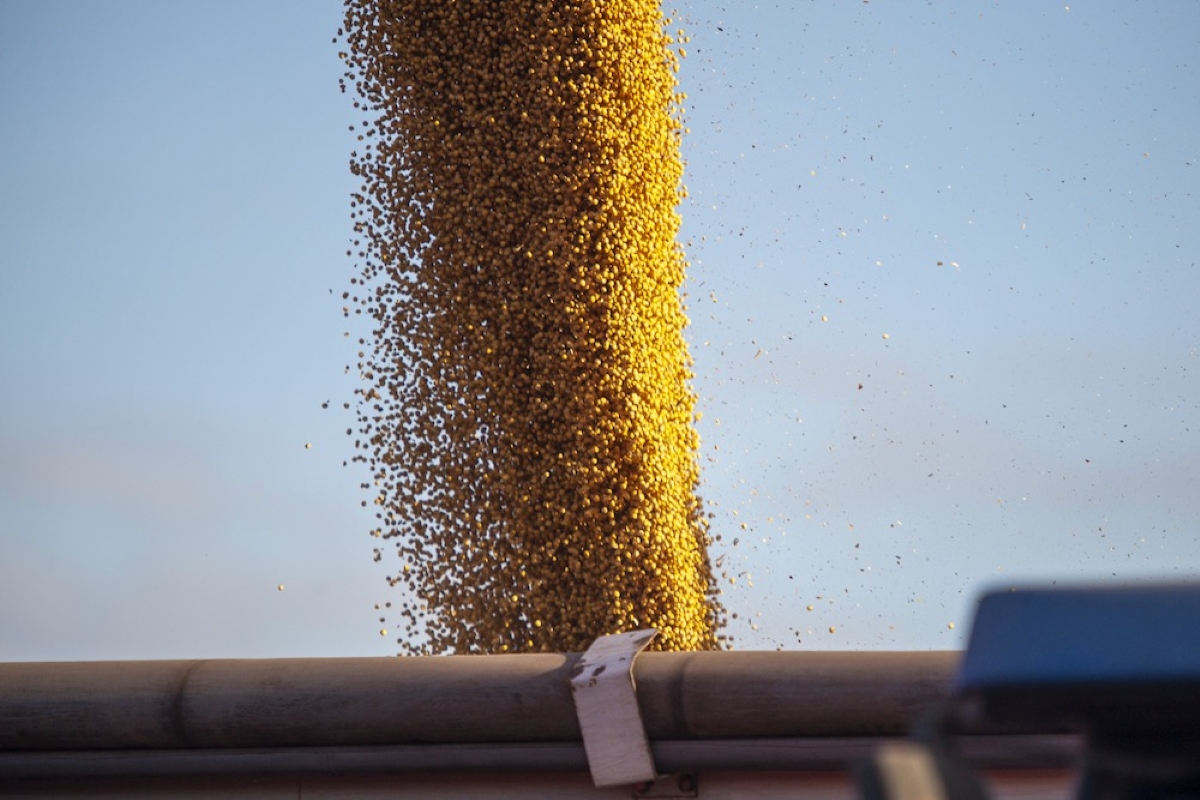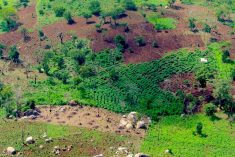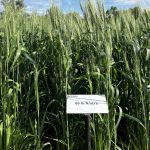The Ontario-based Cellulosic Sugar Producers Co-operative is now ready to sign up farmers to supply 55,000 acres of wheat straw and corn stover to a new plant the co-op will partly own in Sarnia, Ont.
The co-op will be supplying the biomass to a proposed $70 million Comet Biorefining plant to be built in Sarnia. Farmers, through the co-op, will own about 30 per cent of the plant and will work in partnership with Comet Biorefining to create dextrose for use in chemicals and plastics.
“What it is really about is building a market for an underutilized crop residue,” says Dave Park, president of the CSPC, and a Sarnia-area farmer. Modern corn hybrids, with their significantly stronger stalks that stay green longer, have created crop production challenges for farmers. Many farmers have resorted to mowing corn stalks and then tilling by discing, vertical tillage, strip till or mouldboard plowing in order to get a proper seedbed to plant soybeans the next year.
Removing a portion of the stover — and getting paid for it — could be an alternative.
The CSPC held two field days recently in southwestern Ontario to introduce the co-operative to curious farmers and to show off the equipment that will be used by the co-op to harvest and manage the bales of corn stover and straw.

At the field day at Brad Goodhill’s farm near Warwick, a drizzly day didn’t stop farmers from watching the equipment supplied by Advantage Farm Equipment. A Fendt tractor pulled a Hiniker flail chopper as it created 40-foot windrows. It was followed by a Massey Ferguson 2270 HD baler dropping three foot by four foot by eight foot bales which will usually weigh 1400-1600 pounds.
It was followed by a ProAG bale accumulator that picks up 12 bales per run and can pile them easily at the end of the field. The equipment is mostly the same as the equipment currently used to harvest bales for cellulosic ethanol plants in the United States.
The co-op hopes to source about 55,000 acres of corn stover and wheat straw within about an hour’s drive of Sarnia. The co-op will cut and harvest all of the stover and straw itself. Farmers are already busy at this time of year, says Park, so they won’t have to invest in the time and equipment to harvest the stover. Harvest of the stover by the co-op will also assure the bales that come into the plant will be consistent.
Read Also

Brazil to reap record soy crop in 2025/2026, increase exports
Brazil’s Conab said the country will reap a record soybean crop of 177.6 million tons in the 2025/2026 harvest year, according to data released on Thursday.
Farmers and interested groups have been working on the biomass co-op concept for almost four years. It has had the support of local farmer grain handling and retail co-ops Agris Co-operative and Wanstead Farmers Co-operative, along with support from lenders, government, farmer organizations, BioIndustrial Innovation Canada and La Coop Fédérée from Quebec.
“This is what is called a closed co-op,” says Jim Campbell, secretary of the CSPC and general manager of Agris Co-operative. “You have to be an investor in the co-op to deliver biomass into the plant.
“We didn’t want to be just another commodity supplier into a plant. The farmers should own it.”
Luckily, Andrew Richard, one of the founders of Comet Biorefining, had the same vision.
“One of the first things we said is we just don’t want to buy stover from a bunch of farmers, we want to partner back along the value chain,” he said.
That made sense to the farmers and farmer organizations who organized the co-op.
“Who’s kidding who, $4.30 corn is no fun for any of us,” said Park. “So if we can add value to $4.30 corn per bushel without having to put more costly inputs into the ground, I’m all for a value-added opportunity.”
The business plan calls for farmers to start delivering biomass in 2017.
The deal:
– Farmers who want to sell wheat straw or corn stover through the co-op to Comet Biorefining will have to invest in it.
– Farmers will have to invest $500 for a membership share, and $200 per acre for each acre in their supply agreement. – – Farmers will be asked to commit at least 100 acres, with 1.5 tonnes of stover produced per acre. If they can’t produce that much stover, they will have to procure it from another source.
– Farmers will be paid about $40 per tonne of wheat straw and $25 per tonne of corn stover, so on average a $42 per acre return at 15.5 per cent moisture.
– As owners, farmers will get a variable return on their investment that will depend on the price of dextrose, which is indexed to glucose sugar price. Glucose sugar is affected by the price of corn and has a floor price in the market based on ethanol production. Campbell says the investment in the plant should return about $20 per acre.
– Farmer investments will be held in escrow until the construction of the plant begins. Other funds will be used for development of the concept until then, which Campbell says is rare in the co-op development world.















